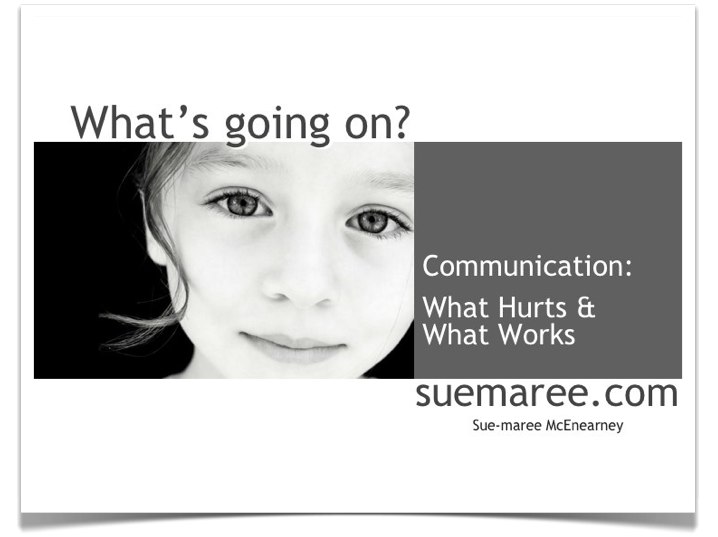Presentation Details
What's Going On?
Communication: What Hurts & What Works
Live Presentations
for Corporate, Government, School, Marketing & Networking Events
"What's Going On?" Presentations
- Communicating with Colleagues & Clients: in the Workplace
- Communicating with Partners: in Dating & Relationships
- Communicating with Children: for Parents, Teachers & other Carers
- Communicating with Adults: for Children
NOTE:
All programs address Bullying Behaviours to the extent relevant to the group.
There's lots of information on the site about the "What's Going On?" communication model—videos, cartoons, and articles, and preview of the entire Part 1 of the book: "What Hurts" as a slideshow.
Each "What's going on?" presentation incorporates elements from the book most relevant to the circumstances of the group at the time.
If you'd like to read the entire book prior to making a booking—contact me and I'll send a password for a complimentary download.
This page provides the following details of the "What's going on?" presentations:
- Presentation Content
- Presentation Style
- Presentation Formats
- Presentation Logistics
- Presentation Guarantee
Presentation Content
Sue-maree's presentations are all about "What's Going On?" in Communication: What Hurts & What Works.
Broadly, "What's Going On?" presentations explore the fundamentals of;
- What causes communication problems
- What we can do about it.
The programs reveal;
- Communication strategies we're using that contribute to communication problems
- Communication strategies we can use to avoid communication problems—WITHOUT avoiding the issues! and
- What we can do to "fix" communication problems if/when we have them.
"
How do we:
-
ask for what we want without demanding?
-
say what we think without being critical?
-
be discerning without being judgmental?
-
say no without feeling guilty?
-
disagree without arguing?
-
communicate without confronting?
-
be honest without being brutal?
-
be confident without being arrogant?
-
be accepting without being a doormat?
-
stand up for ourselves without being a bully?
Each program includes;
- How to deal with even the most difficult communication situations with class and style—and NO STRESS!
- Bullying: What it is, and how to handle it quickly and easily—without being a bully!
I know, sounds too good to be true! Happily—it's easy when we know how!
These are fundamental communication skills that apply regardless of where we are, who we are and who we're with. They work in our professional relationships and our personal relationships, and they're especially relevant in stressful communication situations.
Each presentation is designed to facilitate the application of the content to the specific situations and difficulties participants are experiencing.
The "What's Going On?" communication skills:
- Improve the quality of communication between people
- Increase understanding between people, and
- Improve problem-solving.
They also:
- Increase understanding of bullying
- Reduce bullying
- Improve skills for responding to bullying—without resorting to bullying.
All of which:
- Improve outcomes—both long-term and short-term
- Build trust
- Improve morale.
These benefits reap rewards in terms of:
- Social Skills
- Leadership
- Teamwork
- Planning
- Creativity
- Problem-Solving
- Decision-Making
- Conflict Resolution.
And, where applicable:
- Sales
- Customer Service
- Recruitment & Retention
- Loyalty.
What makes the "What's Going On?" communication model different from other communication models?
"What's Going On?!" presentations are NOT about...
- getting better at manipulating, coercing, forcing people to "our" point of view, nor
- more graciously "giving up" our point of view and "giving in" to others point of view.
"What's Going On?!" presentations ARE about...
- Healthy, emotionally mature, "functional" communication that builds trust—as opposed to unhealthy, immature, "dysfunctional" communication - that destroys trust
- Standing up for ourselves when people are trying to dominate/intimidate us—without dominating/intimidating them (no striking out) and without wimping out (no sucking it up)!
- Communicating with respect for both ourselves and others—even in the most difficult situations
- Communicating on the basis of equality and cooperation
- Taking Responsibility for what is our responsibility, and respecting the responsibilities of others
- Exchanging information for mutual understanding
- Problem-solving for mutual benefit
- Respecting and acknowledging differences in views and desires
- How to communicate when people refuse to communicate
- The truth about honesty, including;
- How to use "gentle honesty" rather than "brutal honesty" and
- How to be honest without disclosing confidential/personal information.
Wouldn't that be great?!
"
...the content, the message, is excellent. I am a counselling psychologist of many years' experience, and have a very good knowledge of the kinds of communication that cause harm, and those that work to create harmony while allowing people to protect themselves...this is communication research-supported to work. Dr Bob Rich
Psychologist, Author, Editor
,
Director, Australian Psychological Society
Presentation Style
Sue-maree's presentation style reflects the communication style she advocates. No dominating, no patronizing, no judging, no lecturing, and no wimping...
Each presentation is a cooperative, relaxed, engaging, fun, (and funny!) exploration of "What's going on?" in communication—like friends getting together over a cup of coffee to do some problem-solving...
- Connecting with communication difficulties,
- Understanding the dynamic that's creating the problems
- Exploring options for resolving the problems, and
- Testing and practising new skills.
Piece of cake!
Presentation Formats
Presentation formats include:
- Keynote sessions;
- plenary sessions, breakout sessions, accompanying persons sessions
- Workshops and Facilitations;
- by the hour, half-day, full-day, and 2-day
- Seminars
- Full-day and 2-day programs
Presentations are available as part of:
"Event" Programs
Conferences, Seminars, Leadership Retreats, Strategic Planning Days.
"In-house" Programs
In-house delivery—for Departments, Teams, and/or Individuals—1:1 Coaching. The smaller the group, the more individual the attention for participants.
"Marketing / Promotion" Programs
Events for your clients / potential clients as part of: networking / marketing / promotion / customer service strategies.
Presentation Logistics
Naming of Presentations
Each presentation can be named specifically to fit your event theme and focus. A few idea starters;
- "What's Going On?!" Communication: What Hurts & What Works
- Difficult Conversations Made Easy
- What To Say When You Don't Know What To Say
- "That's what I wish I'd said!"
- Grace Under Fire: Never be set up, or put down again!
- The Stress-free Professional / Teacher / Parent / Partner
- Communication Skills for Loving Life-Long Relationships
Pre-Event Support
Depending on what you want/need for your specific event...
To promote the presentation;
- Bio & photo/s for the event program & marketing
For the presentation;
- Intro & 'Outro' for the presentation
- Powerpoint
- Handouts
Emails to participants before the event serve to;
- Generate interest and engagement in the sessions, and
- Gather information about specific problem issues that can then be addressed in the session.
(confidentiality and anonymity guaranteed!)
Anything else you might want/need by arrangement!
Post-Event Support
Follow-up strategies to consolidate and integrate the message include;
- "What's Going On?" members only password access* to the website for free resources and forums - continuously updated... including...
- Downloads of content delivered in the presentations
- References from the presentation for easy follow-up
- "What's Going On?" digital version of the book for each participant.
* Password access to the site means we can identify issues of greatest interest & engagement, and areas requiring further attention.
Opt-in options include;
- "What's Going On?" tips—via email—short & sweet—simple, practical tips & tools
- "What's Going On?" tips—via twitter—extremely short!
- "What's Going On?" webinars—online group discussions & coaching.
Presentation Guarantee
Why choose Sue-maree? Here's my personal presentation guarantee:
- Top quality content
- Engaging delivery
- Since communication is universal, it's relevant for virtually every group
- Suitable for the "tough" time slots—first thing in the morning, (especially the morning after a conference dinner!) and after lunch when people are inclined to be a bit dozzzzzey...
- Multiple Session Discounts*
- Money-back Guarantee
Complementary Sessions...
All the sessions are complementary (that's complementary, not complimentary—except by arrangement!).
For example, at a Conference; a keynote can serve as a launch pad for a workshop and/or individual coaching, continuing with further sessions "in-house" after the event—as part of an ongoing professional development program or roll-out across departments/the entire business.
*Multiple Session Discounts...
Multiple session bookings for the same event and/or consecutive days attract discounts which works out well for both of us.
For you:
- Fewer speakers to deal with
- Reduces the aggregate amount spent on travel
- Reduces the aggregate amount spent on speakers
(that's the 'Chartered Accountant' coming out in me!)
- Complementary sessions increase retention and integration of the content
(that's the 'Educator' in me!)
For me:
- I save on travel time & energy
- I get to spend more time engaging with people exploring and resolving communication issues, and less time waiting around in airports.
to waiting around in airports!)
If you think the "What's Going On?" communication skills would benefit the people you represent — I'd love to work with you, and look forward to hearing from you.


